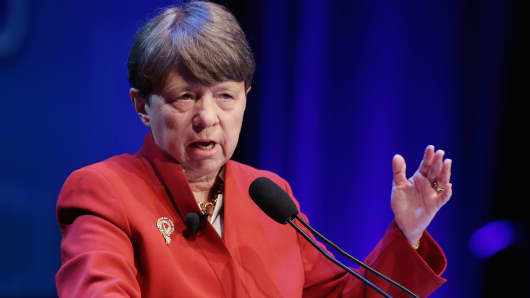Punting on money market fund reform has become the norm for the Securities and Exchange Commission.
The most immediate regulatory threat to the mutual fund industry is reform of money market mutual funds, but if fund executives were hoping that new SEC Chairwoman Mary Jo White would shed light on her approach in a Friday morning speech at the Investment Company Institute annual conference, they were likely disappointed.
Only 18 days into her tenure, and with the back story of the money market fund issue already a sore spot between the industry and regulators—and even within the SEC a partisan political divide over the issue—it might have been too much to expect White to dive into this issue.
(Read More: Fund Investors Flee US for Emerging Markets)
White said only that, "the goal of the SEC is to preserve the economic benefits of the product, while addressing potential redemption pressures and the susceptibility of these funds to runs—runs in which retail investors are especially likely to suffer losses." White added that the SEC staff and commissioners do hope to come up with a balanced proposal in the near future.
As a result of money market funds that "broke the buck" during the financial crisis—failed to maintain a stable net asset value (NAV) of $1 for every $1 placed into the fund by an investor—and a subsequent "run" on money fund assets, a multi-year effort at the SEC to reform regulation of the product class was undertaken. Last summer, though, the SEC failed to reach agreement on a plan, derailing outgoing SEC chairwoman Mary Schapiro's best efforts to crack the money fund riddle.
Schapiro wanted the funds to start holding cash reserves or to let their share prices fluctuate, instead of promising to pay investors $1 for every $1 they put in. Fund companies fear that a floating net asset value will result in a mass exodus of investor assets from money funds and back into banking products.
(Read More: What 21st-Century Mutual Fund Investors Want)
Recently, BlackRock CEO Larry Fink suggested that the money fund reform could be divided between prime money funds—funds that hold "riskier" securities—that are forced to have a floating net asset value, and more conservative money funds that can maintain the stable net asset value that has been synonymous with the product.
If Fink's opinion proves correct, it would be a huge change for the fund industry. There is currently $2.2 trillion invested in taxable money market assets, of which 60 percent is in prime funds that may wind up with a floating NAV, according to Morningstar.
In her Friday morning speech, White provided an overview of her vision for the SEC in the context of a global securities framework, rather than delving into the intricacies of money funds and reform options. She highlighted the heightened role the SEC is now playing in the world's increasingly global financial and regulatory systems.
"Effective regulation of the U.S. financial system requires us to be a part of the fabric of a global financial and regulatory system that transcends political boundaries," she said. "It demands that we match our regulatory and enforcement priorities with those of scores of jurisdictions around the world."
Currently, the SEC is cooperating with its foreign counterparts to support the capital markets, while also helping to "drive economic growth and create jobs in a way that does not lower the bar or relax the regulatory and oversight standards that protect investors and stabilize markets," she said.
(Read More: U.S. Savings Crisis: You Are Part of the Problem)
White added that the SEC is currently strengthening its relationships with overseas regulators and international organizations such as the International Organization of Securities Commission and the Financial Stability Board to help promote better coordination between financial regulators.
"Such coordination not only allows agencies to better achieve their own domestic agendas, but by encouraging the adoption of high-quality regulation around the globe, it also helps to prevent regulatory arbitrage," she said.
White also spoke about the role the SEC now plays in regulating the multi-trillion dollar derivatives market, which up until the financial crisis was largely unregulated. She said that the organization is continuing to push for regulation of the global derivatives markets.
"Just two days ago, by unanimous vote, the commission proposed an approach for reconciling the U.S. regulatory system with requirements in other jurisdictions for swaps transacted across borders," she said. The proposal provides much needed certainty and "rules of the road" for global market participants, including mutual funds investing in derivatives, White said.
The approach allows foreign market participants, whose transactions would otherwise be subject to Dodd-Frank Act requirements to comply with their home country's requirements, as long as their local regulations are comparable with those under U.S. law. If the corresponding regulations are not comparable, then those participants would have to comply with the U.S. rules.
"This gives us the best hope of achieving internationally effective regulation without diminishing the protection our investors and markets demand and deserve," White said. "What happens overseas matters here at home, and matters more every day."
The SEC is expected to act this year on the money fund issue, too, but for the time being, there's just one more punt by the agency, leaving fund executives in a state of instability when it comes to the long-held concept of a stable NAV.


